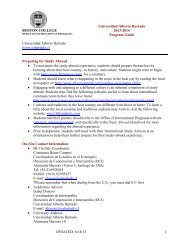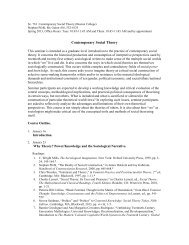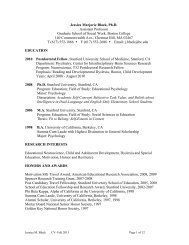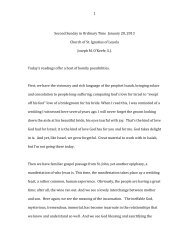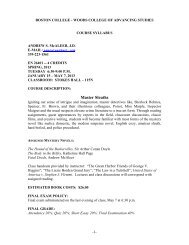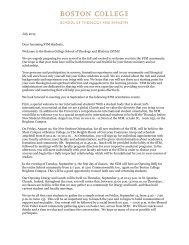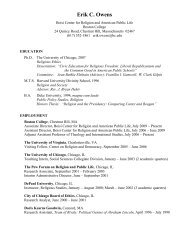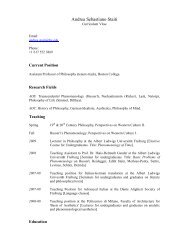separation of powers in thought and practice? - Boston College
separation of powers in thought and practice? - Boston College
separation of powers in thought and practice? - Boston College
You also want an ePaper? Increase the reach of your titles
YUMPU automatically turns print PDFs into web optimized ePapers that Google loves.
2013] Separation <strong>of</strong> Powers <strong>in</strong> Thought <strong>and</strong> Practice? 447<br />
functions <strong>of</strong> execution <strong>and</strong> adjudication. Necessary, I emphasize, not<br />
sufficient. As Daryl Lev<strong>in</strong>son <strong>and</strong> Richard Pildes <strong>in</strong>dicate, party cahoots<br />
between legislators <strong>and</strong> executive <strong>of</strong>ficials may have the effect <strong>of</strong> underm<strong>in</strong><strong>in</strong>g<br />
the <strong>separation</strong>, even if the <strong>powers</strong> themselves are put <strong>in</strong> different<br />
h<strong>and</strong>s.48<br />
Locke’s argument is not the most sophisticated argument <strong>in</strong> the<br />
world, but it is an <strong>in</strong>terest<strong>in</strong>g one. And it has the advantage <strong>of</strong> po<strong>in</strong>t<strong>in</strong>g<br />
specifically to functional <strong>separation</strong>. It is not a theory about the dispersal<br />
<strong>of</strong> power as such, or about checks <strong>and</strong> balances. It is a theory specifically<br />
oriented to the Separation <strong>of</strong> Powers.<br />
V. Separation <strong>in</strong> Thought<br />
I also want to mention one other argument that John Locke<br />
makes, though I am afraid this is an anti-<strong>separation</strong> <strong>of</strong> <strong>powers</strong> argument.<br />
It beg<strong>in</strong>s from his realization that the tripartite division <strong>of</strong> function<br />
envisaged <strong>in</strong> the traditional formulas may not be satisfactory.<br />
Locke envisages a fourth power: the federative power, “the Power <strong>of</strong><br />
War <strong>and</strong> Peace, Leagues <strong>and</strong> Alliances, <strong>and</strong> all the Transactions, with all<br />
Persons <strong>and</strong> Communities without the Commonwealth.”49 I will refra<strong>in</strong><br />
from go<strong>in</strong>g <strong>in</strong>to detail here, but Locke makes a pretty good case for<br />
say<strong>in</strong>g that this power should be united with, not separated from, the<br />
executive power. Or at least it should be united <strong>in</strong> the same h<strong>and</strong>s, the<br />
same agency, even if it is understood to be separate <strong>in</strong> pr<strong>in</strong>ciple.<br />
And that is a po<strong>in</strong>t I want to stress. Even while Locke accepts that<br />
the same person will have to exercise both <strong>powers</strong>, it is important to<br />
underst<strong>and</strong> that the <strong>powers</strong> <strong>in</strong> question are <strong>in</strong> pr<strong>in</strong>ciple separate. As he<br />
states:<br />
Though, as I said, the Executive <strong>and</strong> Federative Power <strong>of</strong> every<br />
Community be really dist<strong>in</strong>ct <strong>in</strong> themselves, yet they are<br />
hardly to be separated, <strong>and</strong> placed, at the same time, <strong>in</strong> the<br />
h<strong>and</strong>s <strong>of</strong> dist<strong>in</strong>ct Persons. For both <strong>of</strong> them requir<strong>in</strong>g the<br />
force <strong>of</strong> the Society for their exercise, it is almost impracticable<br />
to place the Force <strong>of</strong> the Commonwealth <strong>in</strong> dist<strong>in</strong>ct, <strong>and</strong><br />
not subord<strong>in</strong>ate h<strong>and</strong>s; or that the Executive <strong>and</strong> Federative<br />
Power should be placed <strong>in</strong> Persons that might act separately,<br />
whereby the Force <strong>of</strong> the Publick would be under different<br />
48 Lev<strong>in</strong>son & Pildes, supra note 25, at 2344.<br />
49 Locke, supra note 29, at 365.



